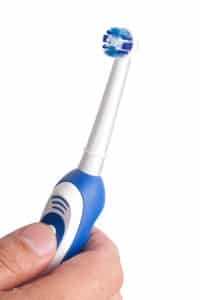 In order to avoid dental infections like tooth decay and gum disease, you must practice preventive dentistry; excellent oral hygiene, visiting your dentist, and maintaining a healthy diet. Your oral hygiene depends on how (and how often) you brush and floss your teeth at home every day. While you may be used to using a manual toothbrush, an electric toothbrush may be more effective in some cases – especially if you’re prone to bacteria or have suffered from gum disease before. However, not every electric toothbrush is the same, like most manual toothbrushes. One you buy from the grocery store for example, is going to be very different from one you get from your dentist.
In order to avoid dental infections like tooth decay and gum disease, you must practice preventive dentistry; excellent oral hygiene, visiting your dentist, and maintaining a healthy diet. Your oral hygiene depends on how (and how often) you brush and floss your teeth at home every day. While you may be used to using a manual toothbrush, an electric toothbrush may be more effective in some cases – especially if you’re prone to bacteria or have suffered from gum disease before. However, not every electric toothbrush is the same, like most manual toothbrushes. One you buy from the grocery store for example, is going to be very different from one you get from your dentist.
What Would Your Dentist Recommend?
Since electric toothbrushes can widely range in effectiveness, it can be difficult to decide if you should use a manual toothbrush or an electric one. Depending on your individual situation, your dentist may recommend a certain brand of electric toothbrush – like Sonicare vs. Oral-B, to name a couple. Oral-B (and similar brands) typically use a smaller toothbrush head that makes it easier for you to clean those hard-to-reach places. On the other hand, however, the size can also help you to maneuver around orthodontics like appliances or braces. Whereas, a Sonicare toothbrush uses unique sonic vibration (hence the name) to effectively attack bacteria buildup around your teeth.
Your dentist will likely have different recommendations depending on your oral health and history. If you have trouble brushing your teeth, using an electric toothbrush may be easier for you. While you shouldn’t brush for any less than 2 minutes, the quick vibration does a lot of the “brushing” work for you – often making the process more efficient than manual brushing.
